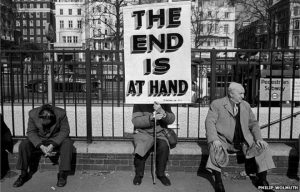 I read across the political spectrum. I would say I read religiously across the political spectrum, but that is using the term in a secondary and impoverished way, which is part of my point in this particular post. When an author has no clearly defined thesis there is a tendency to ramble, or to fall back on form in the absence of content, or to play to the expectations of the audience through deliberate obscurity.
I read across the political spectrum. I would say I read religiously across the political spectrum, but that is using the term in a secondary and impoverished way, which is part of my point in this particular post. When an author has no clearly defined thesis there is a tendency to ramble, or to fall back on form in the absence of content, or to play to the expectations of the audience through deliberate obscurity.
It is by a chance intersection that I encountered two ideologically conservative pieces that suffer from this tendency in the same week, but it could also be that everyone on the right is exasperated by the often vacuous—and always narcissistic—current happenings within the political parties that represent them. I sympathize with them if that’s their defense, and will also agree that the far left can be equally exhausting.
It has become de rigueur for the right’s commentariat to claim that this is not what they expect from the Party of Lincoln or, given a spat with National Review, that the magazine lacks the heft of Bill Buckley’s original ideals. If all of conservatism has become tainted by reactionaries and semi-populists, the very idea of intellectual conservatism huddles against an ever-present and threatening cloud.
So we start with Andrew Sullivan’s rambling in New York Magazine. Sullivan likes to praise the intellectual heft of those he argues against. Maybe he just likes to be pleasant and this is his way of signaling a commonality of purpose, or perhaps it’s to gird his own rejoinders as having equal weight. In this piece, it’s hard to discern why. The entire argument is a typology or map of what a center-right conservative is and is not.… Read the rest

